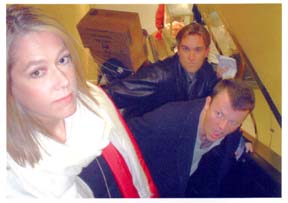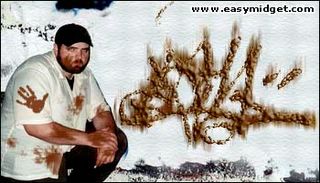As I age I find that I'm increasingly able to identify broad themes in my life and relationships. Years ago I was able to identify
peace as a quality I want and must have in my home life. Peace, stability, consistency. I chose a partner who offers those things, and consequently, my home is peaceful, a safe place to come back to. Hostile, unpredictable people are not invited in or welcomed back. This rule will continue to hold, in all likelihood more firmly, once there is a child in the house.
I believe that choosing a life partner is a lot like choosing a "parent" for your second childhood. If you choose someone who is unreliable, cruel, and emotionally chaotic, you are setting yourself up to relive a childhood with an unreliable, cruel, and chaotic parent. If you choose someone who is reasonable, gentle, and consistent, you are guaranteeing yourself a much more humane and nurturing "second childhood."
Anyway, peace has been an issue for me for a while. But recently I've come to acknowledge another issue, especially in my relationships. It concerns
validation and
invalidation. I've spent most of my life in relationships with people who invalidate my experiences. I've been told, "No, what I did was just fine, YOU are too sensitive." I've been told, "Stop crying, that didn't hurt." I've been told, "It's not broken, we're not seeing the doctor." I've been told, "You had it coming." I've been told that what I remember was wrong, that my anger or sadness were inappropriate or unfounded, that what I say happened could not have happened.
I spent 15 years in close friendship with a woman whose invalidation specialty was "That's nothing, you should hear what happened to ME." That relationship ended when I called her on it. We had an unspoken agreement that my job was to validate her, and her job was... to be validated. I grew tired of it.
When I posted about my dietary frustrations on this blog, a former perfume acquaintance posted that her dietary situation was much worse and at least I could look forward to an end to my troubles. I wondered why her post made me so angry until I realized that it was a classic example of invalidation, of the "That's nothing, you should hear what happened to ME" type. But did I call her on it? No. I fell right back into the validator role: "Yes, you
do have such a difficult diet to follow." Sigh.
Much of the invalidation I've experienced has come from family. I know I'm not alone in this. As the youngest child and only girl, I was not spoiled -- quite the contrary. I was constantly told that I was wrong, that my observations were ignorant, that I would change my tune once I experienced "the real world." The only two people in my family who ever validated me were my oldest brother and my dad. It is mainly on this basis that I still feel affection for them, in spite of other ways they've hurt and disappointed me. But I was deeply hurt recently when I told my dad that my asthma may have come from years of second-hand smoke exposure (I grew up with four 2-pack-a-day smokers in the house), and he replied that he never believed my asthma diagnosis. As if asthma sufferers don't have symptoms! I couldn't breathe, for heaven's sake. But yet, somehow my physicians and I were "wrong." I wasn't sure why his reaction hurt me so much until I was able to give it a label -- invalidation. I'd expected him, of all people, to validate me. But since he was one of the smokers, perhaps he didn't want to believe that he'd contributed to my illness.
There is nothing more devastating than to marshall the courage to confide in someone and have them invalidate your feelings and experiences. This is why I'm shy and hesitant to talk much to others about the deeper aspects of myself, and especially about my childhood experiences. I'm always playing the role of validator but find that only a few people in my life validate me in return. I take responsibility for this -- only now am I learning to distinguish validators from invalidators and to aim my relational investments accordingly. My friends Mindy and Maria are wonderful validators. I cherish them for that. My blogger friend Barbara is a great validator. My husband too. In fact, I've come to realize that the times I've been most deeply angry with him are the times when he's refused to validate my experiences. But now I have a language to talk to him about it, and we continue to move forward.
Why people invalidate is beyond me. I can only guess. Two possibilities come to mind, denial and competition.
Denial: they don't want to believe that some mothers don't love their offspring and want to see them abused, that some clergy violate children, that some soldiers torture prisoners, that they themselves have damaged others with their behavior.
Competition: they have identified themselves as the Supreme Victim and are not willing to acknowledge that their friends/partners/children have endured difficulties too, some more horrifying than their own. These are the only two I can think of now, though I'm sure there are more. One thing I am convinced of: the reason so many people have therapists these days is because their therapist's office is one of the few places where they get guaranteed validation. It's a shame that more of us don't learn to simply listen and validate our loved ones without forcing them to shell out thousands of bucks for a therapist. Trust follows directly from validation. How many people do you have in your life whom
you trust without reservation? If you can count more than two, consider yourself lucky.
No clever end to this post -- just had to get it out there. Thanks for reading.











